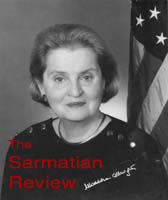| This Issue | Back Issues | Editorial Board | Contact Information |

From the Editor
April 2001
Vol. XXI, No. 2
Our cover page photo is of Madeleine Albright to whom thanks are due for coordinating the admission to NATO of Poland, the Czech Republic, and Hungary. For the sixty million inhabitants of these countries, admission to NATO symbolically meant a readmission to the Western world. As Professor Schlottmann rightly points out in her article on the Polish minority in Germany, the notion that one belonged to the Western world has never faded in East Central Europe, even though it is almost totally absent in the historiography of present day Germany or, more generally, Europe and the United States. Hopefully, the present generation of East Central Europeans working in conditions of freedom will make up for this wrongful neglect.
Secretary of State Madeleine Albright made NATO expansion a cornerstone of American foreign policy. The transfer of Poland, Hungary and the Czech Republic from the Russian bloc to NATO membership has changed conventional force ratios dramatically in favor of the West. It also wrote finis to one of the darkest chapters of human history.
The remainder of this issue is dedicated to problems of postcommunism: the situation at Polish universities, ethnicity and ethnic relations in Central and Eastern Europe, and the continuing necessity to dedicate Central European energies to problems that had long been solved in Western Europe because Western Europe did not suffer half a century of Soviet occupation.
In that connection, we are pleased to publish a paper comparing American and Polish universities. Professor Miroslaw Skibniewski rightly points out that while American universities have been changing fast (perhaps too fast), Polish universities have avoided change at any cost. In conditions of Soviet-occupied Poland, resistance to change was understandable, but in present conditions it often amounts to a perpetuation of perks for the upper lever of a lethargic professoriate. We endorse Skibniewski's call for the abolition of the habilitacja, or the higher doctorate, which hampers the young scholars' ability to conduct and publish independent research. The USA, which leads the world in research, has never had the habilitacja.
On 26 February 2001 in The Wall Street Journal, Cecilie Rohwedder and David Wessel criticized German universities in ways similar to those that Professor Skibniewski employs with regard to Polish universities ("Despite Proud Past, German Universities Fail by Many Measures"). While WSJ authors are less systematic than Skibniewski, they point out the same weaknesses in German universities that Skibniewski sees in Poland: a lack of competitiveness among professors, a lack of active contact between students and professors, poor student retention, excessive reliance on once-a-year exams as opposed to a multitude of small assignments that American students are so familiar with. The result is brain drain: some of the best Polish and German intellectuals and scientists end up at American universities.
Professor Anna Cienciala's thorough review of a book on Gwardia Ludowa-Armia Ludowa compiled by three young Polish scholars is remarkably instructive in its assessment of primary sources and their interpretations. While Polish scholars often publish crucial materials, their scholarly apparatus owes much to the conditions of conspiracy under which scholarship was conducted under communism. Some unscholarly habits have to be shed off and a standardized tone adopted to find an international audience to which Polish scholars aspire.
Dr. Bohdan Vitvitsky's review of Professor Roman Szporluk's important book throws a welcome light on the situation of Ukrainians in Russia. How sad that in conditions of free Russia, not one university considers it appropriate to introduce Ukrainian Studies as an area separate from Russian Studies. The implications of this neglect are many.
Finally, one of our book reviewers has important things to say about Jerzy Urban's Nie, Jerzy Braun's numerous books and booklets, and Jerzy Narbutt's essays. Other reviews deal with histories of Poland and Ukraine, a revealing book on the cult of Witold Gombrowicz in Poland, and more.
Back to the April 2001 issue
The Sarmatian Review
sarmatia@rice.edu
Last updated 04/19/01